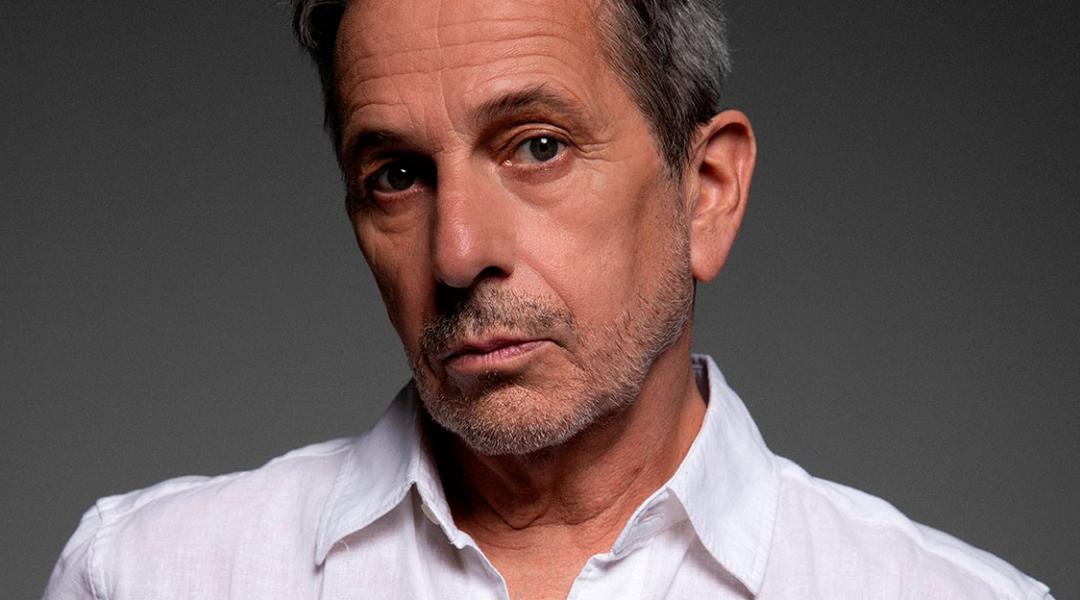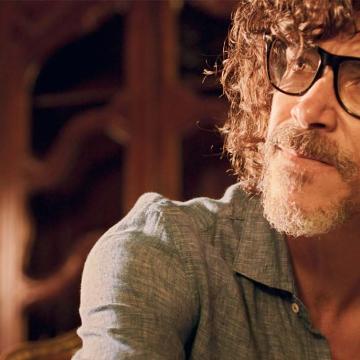Since opening on the 17th of April, Espacio Iberia has welcomed dozens of guests with one thing in common: their infinite talent. Talent that has inspired all the people who have sat there to listen to them.
Alfredo Castro
The art of performing without acting

He’s won the Platino Award for Best Supporting Actor for the second year running, for his role in ‘Karnawal’, and is impressively considered the best Chilean actor of all time. Chameleon-like and multifaceted, Alfredo Castro humorously confirms that he’s an expert in playing monsters, and that the key to his talent is in performing without acting. Through his "metabolism".
Actor, theatre director, educator, founder of the successful Teatro La Memoria theatre company, Alfredo Castro (Santiago de Chile, 1955) has just received his second consecutive Platino Award for Best Supporting Actor, the third in his career. Three is also the number of nominations he’s received for awards that focus on the connection between Latin America and Spain, including more and more co-productions on both sides of the Atlantic.
“What’s happening with film in Latin America seems of the upmost importance to me: it’s the counterbalance to the English-speaking or non-Spanish-speaking North American and European industry —Alfredo Castro assures us—. We share an imagination and have so much in common. For example, we share a sense of humour, and in Chile you can laugh your head off with Almodóvar or get goosebumps with Amenábar. And the same thing happens in Spain: they’re gobsmacked by Pablo Larraín or other Chilean, Argentinian or Mexican directors.” “One of the values of our work is bringing people together, establishing connections,” confirms the actor. The film for which he has received this last Platino Award delves into this idea in terms of its execution —it's a co-production and its technical team includes professionals from all over Latin America—, but also in terms of location.

Alfredo Castro (El Corto) and Martín López Lacci (Cabra) in a scene from ‘Karnawal’. @ Bikini Films
Karnawal is a border film that portrays a complex and racially mixed territory where it’s mainly women who “smuggle goods”, explains the actor, in the grey zone between Argentina and Bolivia. This tough and hostile environment is the context for a dance story featuring the character of El Corto, the father of the protagonist, a thief and former convict. “I’m an expert in monsters —he laughs—. In Karnawal we decided to create a guy —the director Juan Pablo Félix asked me to do so— that, socially, has no choice but to break the law. He has no alternative.” Without a family, without an education, without a support network, he has no other options: “We wanted to create a loving villain, who’s a good father within his capabilities, a good ex-lover to his wife, a good friend... In short, a good person. I humbly believe we did it; the guy appeals to the empathy of the audience”, says Alfredo Castro.
“Throughout my career, I’ve struggled to be a natural actor, to not act. It’s an interesting paradox”
It’s in this character building, and the way he creates those people —oftentimes monsters, in contrast to how nice and calm the Chilean actor seems— onstage or in front of the camera, where Alfredo Castro’s talent shines. The key: A methodology that tries to escape from the (“metabolic” in his own words) method of a professional who’s been onstage for more than forty years but who didn’t launch his film career until the mid-2000s. “Those who aren’t actors, who never studied acting, like the boy in Karnawal, are called natural actors, and to that I say: I’m so jealous! Throughout my career, I’ve struggled to be a natural actor, to not act... I’d prefer to not have studied so as to not act; it’s an interesting paradox,” he explains.
How do you match up this vision of the profession with such a prolific and award-winning career? “Sometimes I feel a bit embarrassed. I’ve worked with many actors and actresses, and most of them arrive on set with an underlined and well-studied script... I read the script a thousand times, but when I’m on set I’m ready to work metabolically, I’d say. I try to face the set, the script, and my co-stars in the cleanest and most spontaneous way possible, giving and receiving everything I can but trying precisely to not act, rather feeling it in my body, directly through my metabolism,” he concludes. In this and many other ways, Karnawal has been a gem: “I took my time with this role: it was really playful, really crazy, unhinged, and full of jokes. We had a blast making this film.”
“To do this job, you need to have a certain brain structure, you need to be born with a good amount of madness”
For Alfredo Castro, “and without falling into clichés”, all human beings have creative talent. It’s the work and dedication that affect the growth of that talent, and acting is an extremely peculiar case: “This is our job, and to be in this field you need to have a certain brain structure. You need to be born with a good amount of madness to be able to replace one body with another, to lend your sensitivity, your emotions, and your story to a fictional being.” In front of the camera, or in a theatre in front of an audience of 10, 100 or 200 people, he explains, “it’s still odd that someone feels so much pleasure exposing themselves, showing their most intimate selves... At least I understand my work in this sense. I don’t learn my roles by heart or study my lines: I try to make them go through my body, my dreams, my losses, my footsteps; through everything I’ve lost but also gained.”
Which has been his latest gain, or at least one of the most relevant? The actor doesn’t hesitate. “I recently gained a family,” he replies. During a shoot in Spain, he explains, highlighting that link, he met a Spanish cousin who’d pieced together the story of his mother’s family until the actor’s grandfather, who emigrated to Chile in the 1920s. “I discovered a family —he laughs—, and that cousin who wrote a book about the Gómez family, my second surname, from Torrelavega. I met them, without ever having a connection before. Isn’t it incredible?”


